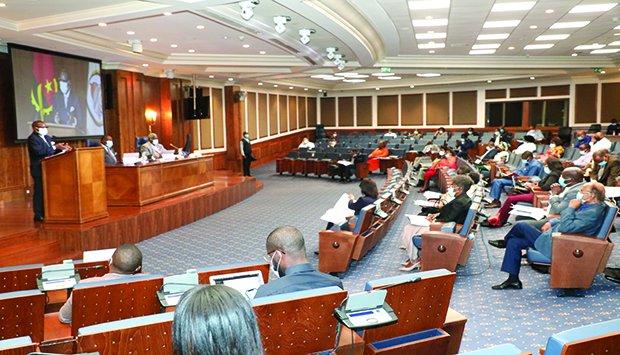Africa-Press – Angola. The work committees of the National Assembly continue, today, the discussion in the specialty of the Draft Law on the General Regime of Administrative Offenses, on the initiative of the Holder of the Executive Power.
In order to prevent the application of arbitrary, disproportionate and illegal fines by the administrative authorities, which were confused with the fines provided for in the Penal Code, the diploma establishes a distinction between the fine and the fine.
According to the statement of reasons, the fine appears as an authentic penalty, that is, as a purely criminal sanction, of a pecuniary nature, whose application is subject to the principle of the judge’s reservation, always presupposing the proven practice of a legal type of crime, having, therefore, the general and special positive prevention of the same as its inalienable purposes.
In his speech yesterday, deputy João Pinto (MPLA) drew attention to the fact that the initiative is commendable, but he stressed the need to safeguard the public interest and not harm it.
“What is private is really private. The concept of property in Angola did not have continuity. There were ruptures. Therefore, it is necessary to be careful. confiscated, nationalized, but they were called into question, because then other citizens appeared who took possession of these goods”, he explained.
For Amílcar Kolela, UNITA deputy, it is hoped that a fair law will be produced, which does not bring promiscuity between public and private interests: “The law is still under discussion. We hope that, if approved, the State will be able to recover its goods and that has a positive impact for Angolans”.
Historically, nationalizations in Angola took place in a context of an economic policy of resistance, characterized by the construction of a planned economy and resistance to the abandonment of the national territory by many owners and holders of shareholdings in private companies, which dictated the approval of the Law no. 3/76, of 3 March.
Political, economic and constitutional developments advise, on the one hand, the revocation and, on the other hand, the adoption of a legal regime of public appropriation through nationalization whenever and when the conditions allow it.
At the present time, enormous challenges are thrown to the States. Among the main ones will be: the defense of the economic system against financial crises and the fight against property crimes that harm public goods, according to the document.
The existing legislation, says the document, is all pre-constitutional and incapable of, by itself, giving a sufficient answer to the problems that raise the public appropriation of goods, rights, social participation, among others.
The objective of the present diploma, in fulfillment of the Constitution, is to approve the rules relating to public appropriation, also introducing direct means of transferring goods unjustifiably removed from the public patrimony, thus providing the State with instruments for the pursuit of its asset recovery policy. illegitimately transferred to the private sector.
Public appropriation works, under the terms of this Bill, through three means: nationalization, the voluntary delivery of goods and the judicial declaration of transfer of goods to the State.
All movable and immovable property, shareholdings, securities, intellectual property rights and other types of property may be part of the appropriation provided for by law, whether owned by the person concerned or subject to legal or voluntary succession.
The grounds for the act of public appropriation are also provided for in the new wording of article 37 of the Constitution of the Republic of Angola, namely, the safeguarding of the national interest when national security, food security, public health are at stake. , the economic and financial system, the supply of goods or the provision of essential services.
For More News And Analysis About Angola Follow Africa-Press






